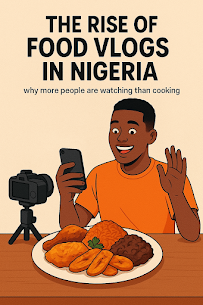
In recent years, food vlogging has taken Nigeria by storm. From YouTube to Instagram and TikTok, food-related content is everywhere – and Nigerians can’t seem to get enough of it. Interestingly, while millions of people tune in daily to watch food vlogs, far fewer are actually rolling up their sleeves in the kitchen. The question is: why are more people watching food than cooking it?
1. Food as Entertainment
Gone are the days when cooking shows were limited to television. Today, food vlogs have become a major form of entertainment. The colorful presentations, mouth-watering close-up shots, and the personalities of vloggers keep viewers glued. Nigerians watch for fun, relaxation, and even inspiration, the same way they watch movies or comedy skits.
2. Curiosity About New Recipes
Nigeria is a land of rich food culture – jollof rice, suya, nkwobi, egusi, the list goes on. But food vloggers are exposing audiences to a mix of both local and international dishes. People may not be ready to try out a Thai curry or experiment with baking sourdough bread at home, but they enjoy the thrill of watching others do it. It’s curiosity satisfied through a screen.
3. The Convenience Factor
Cooking takes time, effort, and money. In a fast-paced society where many Nigerians work long hours, ordering food or eating out is often more convenient than preparing meals from scratch. Watching food vlogs offers the experience of food exploration without the stress of kitchen work.
4. Social Media Influence
Food vloggers in Nigeria are no longer just “people who cook on camera.” They are influencers, storytellers, and trendsetters. Their videos are aesthetically pleasing, engaging, and highly shareable. Platforms like TikTok and Instagram reward short, visually striking clips, making food vlogs addictive. People follow not only the food but also the lifestyle of the creators.
5. Living the Experience Without the Calories
For many viewers, food vlogs are a safe way to enjoy indulgent meals without worrying about health concerns or calories. Watching a vlogger devour a giant burger, a plate of pepper soup, or a massive seafood boil brings satisfaction to viewers who may not want (or be able) to eat that much themselves.
6. Community and Connection
Food vlogging has built vibrant communities online. Comment sections are filled with debates on which region makes the best jollof rice, tips for perfect puff-puff, or shared childhood memories of grandma’s cooking. For many Nigerians, watching food vlogs feels like being part of a virtual dining table where everyone has a voice.
Conclusion
The rise of food vlogs in Nigeria reflects a shift in how people experience food. Cooking may be slowing down in many households due to busy lifestyles, but food content is thriving because it offers entertainment, cultural connection, and inspiration at the click of a button.
In the end, while more Nigerians may be watching than cooking, food vlogs are keeping our culinary traditions alive – and sparking new ones along the way.